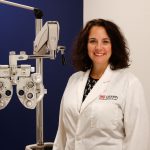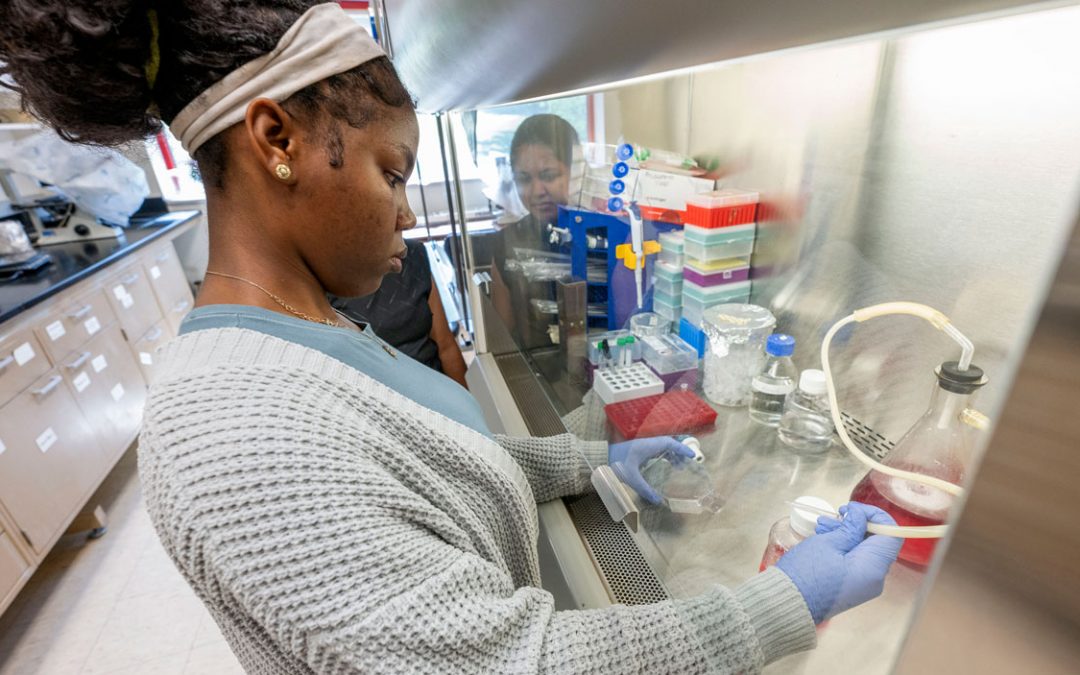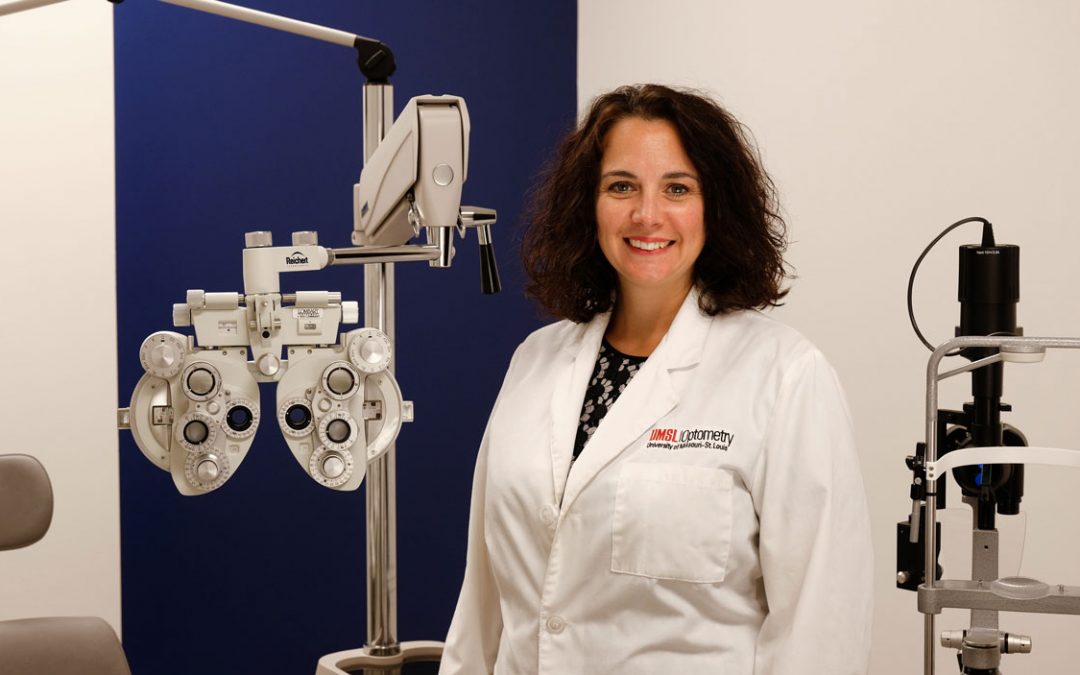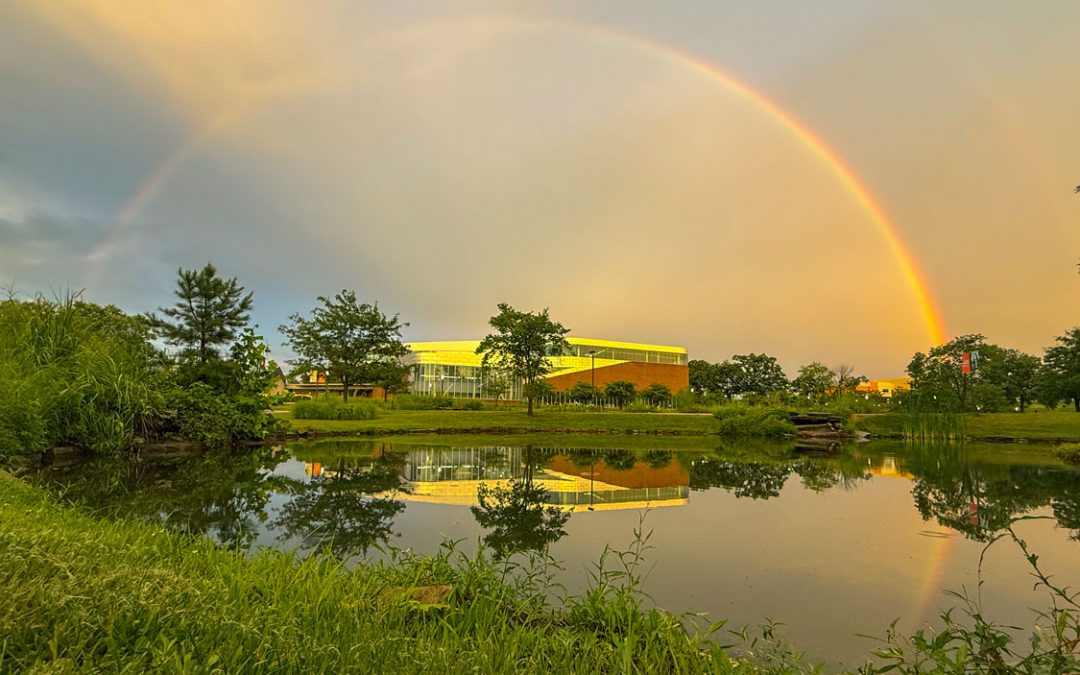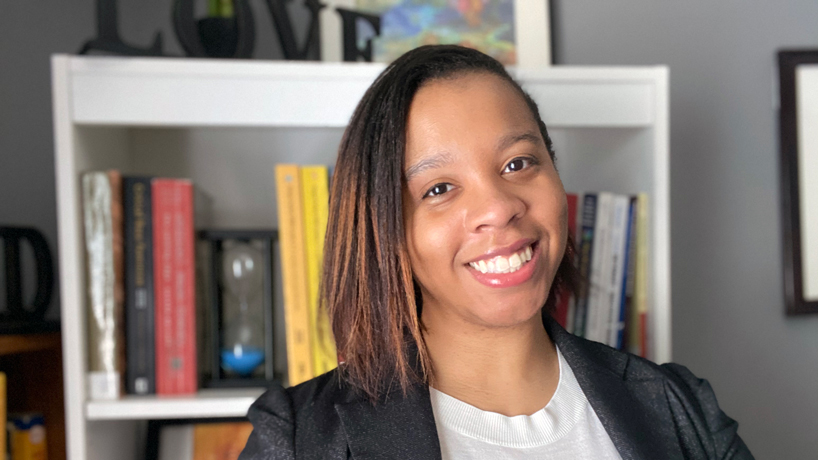
Zori Paul won the National Board of Certified Counselors Minority Fellowship Award, which included a $20,000 prize to support her PhD research on identity affirmation of bisexual+ women of color. Paul has also studied cross-cultural mentorship and investigated the efficacy of Parent-Child Interaction Therapy through an assistantship with Dr. Joan Luby of Washington University in St. Louis. (Photo courtesy of Zori Paul)
A good deal of Zori Paul’s April was spent refreshing her email.
She had applied for the National Board for Certified Counselors Minority Fellowship Award and was eagerly awaiting a decision – one she was certain would land in her inbox.
Paul was so certain she would get an email that she neglected her phone and missed a call from a strange number. After listening to the voicemail, she called back unsure of what to expect.
“In the most monotone voice, the woman said, ‘Hi Zori, I’m just letting you know that you were awarded the NBCC Minority Fellowship,’” Paul recalled.
In stark contrast, Paul screamed and took a victory lap around her apartment. Though most people would do the same if they were awarded $20,000.
The NBCC Minority Fellowship provides financial support to graduate students who commit to serving minority communities through research or service. The award will help Paul as she continues to conduct research on identity affirmation of bisexual+ women of color for her counseling PhD in the College of Education at the University of Missouri–St. Louis.
Before coming to UMSL, Paul earned a bachelor’s in comparative human development from the University of Chicago and a master’s in clinical mental health counseling from Northwestern University. She also spent a year working as an assistant to the Illinois Secretary of Education.
In addition to her current research, Paul has also studied cross-cultural mentorship and investigated the efficacy of Parent-Child Interaction Therapy through an assistantship with Dr. Joan Luby of Washington University in St. Louis.
Paul has excelled academically and as a researcher, but that’s no surprise to anyone who knows her. Her family and community placed a strong emphasis on education, so there was never any question that she would go to graduate school.
Her mother was particularly influential and first fostered Paul’s interest in counseling.
“My mom was going back to school to get her counseling degree – she was a Chicago Public Schools teacher – and I remember coming across one of her books and being like, ‘What’s this?’” Paul said. “She said, ‘Well, you know how there are doctors who heal people physically? There are also people who can help people emotionally and mentally.’”
Her mother’s influence aside, Paul isn’t surprised she gravitated toward a field like counseling. Listening to fairy tales and fables as a child, she was never interested in being the princess. She wanted to be the fairy godmother – the person who helped others in their time of need. As she got older, she also saw the need for mental health resources in the Black community.
After graduating from the University of Chicago, Paul took some time to work even though she knew she wanted to further her education. She spent a year in the Illinois Office of the Governor, assisting the Secretary of Education to see if she would be interested in pursuing education policy in graduate school.
The experience and her entrance interview with Northwestern reaffirmed her commitment to counseling and the mental health field. As her time at Northwestern closed, Paul knew she wanted to pursue a doctoral degree.
“After my master’s, it felt like I was hitting my stride,” she said. “I was afraid that if I didn’t go straight into a PhD program, I probably wouldn’t.”
She started looking at PhD programs in the Midwest near Chicago and her family and a few on the East Coast near friends. In particular, she sought programs accredited by the Council for the Accreditation of Counseling and Related Educational Programs, which would allow her to train counselors in the future.
A faculty member at Northwestern suggested UMSL’s program, but Paul was reluctant at first because she didn’t know many people in the St. Louis area. Initially, she wanted to attend George Washington University in Washington, D.C., but applied to UMSL, as well.
Paul started to reconsider her plans as she moved along in the application process.
She found UMSL particularly welcoming. There were times when she was unsure of what decision to make, but UMSL faculty members were quick to contact Paul about her acceptance and won her over. She was also attracted to the program’s focus on social justice and found that Susan Kashubeck-West’s research dovetailed nicely with her own academic interests.
At UMSL, Paul continued research she started at Northwestern on bisexual+ women – those who are sexually, emotionally and/or romantically attracted to more than one gender identity. She’s specifically interested in women of color who are bisexual.
In general, there isn’t much scholarship on the subject, especially regarding women of color, and there are still many prevailing misunderstandings about bisexuality.
“I find that kind of weird in the counseling field, where we’re so focused on helping our clients, helping others with their mental health and their mental wellness,” Paul said. “How can we help those people if we don’t even know how to best do that?”
Her research examines what effect positive affirmation of bisexual identity has on a person. Paul noted that there is already research to show that microaggressions and harassment are often detrimental to mental health, and she wanted to study the flipside of that dynamic.
In addition to her dissertation research, Paul is looking at cross-cultural mentorship with fellow Northwestern alumni and a former professor. It’s a topic that’s close to her.
“In terms of the cross-cultural mentorship research, that comes from my own experience as a Black woman who has gone to a lot of predominantly white institutions, who has had to really advocate for myself with some of my mentors,” she said. “A lot of times in very uncomfortable ways.”
Paul also had the opportunity to work with Luby, the Samuel and Mae S. Ludwig Professor of Child Psychiatry at WUSTL. She received an assistantship to work on Luby’s Parent-Child Interaction Therapy project in collaboration with the Urban League and the Jennings School District.
PCIT is similar to play therapy where children are able to heal through playing in a fun, safe environment. A parent engages with the child directly while a therapist supervises from another room. Paul said it gives families an alternative to yelling and spanking, which can have lasting detrimental effects.
Luby wanted to determine whether the method could be helpful for families in the St. Louis area, particularly those with children showing signs of depression. Preliminary research focused on white families, but Luby extended the project to Black families in the Jennings School District. Paul became certified in PCIT and served as one of the therapists working with families.
The project wrapped in January and data is still being evaluated, but the initial findings show that PCIT is effective.
“It doesn’t just help the kid who has the behavioral issues,” Paul said. “It’s been shown to help the parent who’s there with the kid, but also if there are other kids in the family, it’s been shown to have positive effects with those kids, as well.”
These research projects have been one of the most fulfilling parts of Paul’s academic career. Early on, she experienced moments of gatekeeping but was determined to prove she could excel as a researcher.
“I think it’s just cool to do research and to know that I can do research,” she said. “I think it really hit me that like, ‘Oh, I’m a researcher’ when I finally got my first article accepted, my own solo article.
“Oftentimes, people of color, especially a lot of Black students, feel like research is something that only certain groups of people do or that you have to be super smart. You have to be ethical and know what you’re doing, but I think anyone can do research.”
After graduating next year, Paul hopes to find a faculty position at a university and continue working on her research. No matter where she ends up, though, she’s thankful for her time at UMSL.
“The counseling program is really about the students,” she said. “I really appreciate the faculty members and how they let us do what we feel called to do.”




